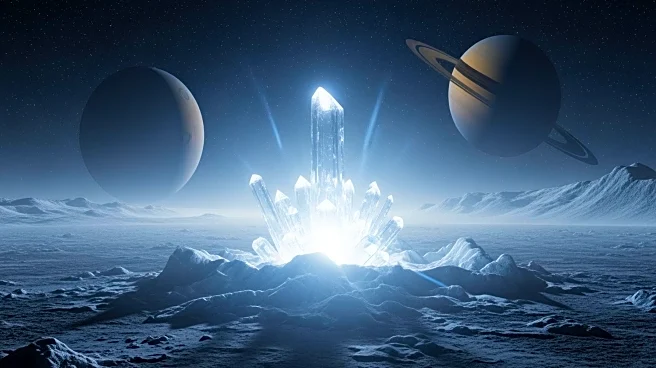What's Happening?
Recent laboratory research has suggested that some organic molecules detected in plumes from Saturn's moon Enceladus may be products of natural radiation rather than originating from the moon's subsurface
ocean. Led by planetary scientist Grace Richards at the National Institute for Astrophysics in Rome, the study simulated conditions near Enceladus's surface by creating a mixture of water, carbon dioxide, methane, and ammonia, which are expected components of surface ice on Enceladus. The research found that radiation could induce chemical reactions producing molecules such as carbon monoxide and various alcohols, raising questions about the true origin of these organic compounds.
Why It's Important?
This discovery complicates the assessment of Enceladus's potential habitability, as the presence of organic molecules was previously considered evidence of a chemically rich environment under the ice. The findings suggest that radiation, rather than biological processes, might be responsible for some of these molecules, impacting the interpretation of data from past missions like NASA's Cassini spacecraft. Understanding the processes that modify material in space is crucial for future missions to icy moons, including NASA's Europa Clipper and ESA's JUICE, which aim to explore subsurface oceans on Jupiter's moons.
What's Next?
The research calls for caution in linking the presence of organic molecules directly to Enceladus's ocean composition. Future missions to Enceladus and other icy moons will need to consider radiation chemistry in their analyses. The findings will guide the design of instrumentation and interpretation of results for potential missions dedicated to Enceladus, which may include high-speed flybys through the plumes or a lander on the south pole.
Beyond the Headlines
The study highlights the complexity of Enceladus's chemistry and reinforces its status as a prime target in the search for extraterrestrial life. Despite the challenges in determining the origin of organic molecules, Enceladus remains a promising location due to its liquid water, energy source, and rich chemical environment. The insights from this research will be crucial for planning future explorations and understanding the potential for life beyond Earth.









